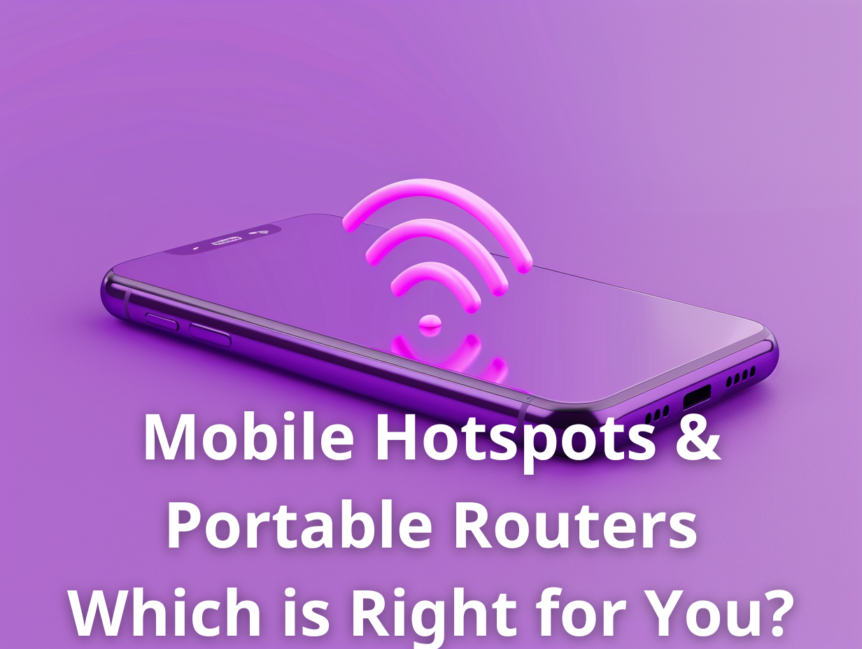Live Updates Thank you to all that attended our Annual Meeting this last Saturday!

Mobile Hotspots & Portable Routers – Which is Right For You?
Staying connected while on the go is essential. Whether you’re a digital nomad, frequent traveler, or remote worker, reliable internet access is a must. Two popular options for staying connected are portable routers and mobile hotspots. Let’s explore the differences between these devices and help you determine which one best suits your needs.
What are Portable Routers?
A portable router is a small, lightweight device that creates a private Wi-Fi network. It allows you to connect multiple devices to the internet simultaneously. Portable routers work by connecting to a cellular network or existing Wi-Fi network and broadcasting a new, secure Wi-Fi signal for your devices.
The advantages of using a portable router are numerous:
- Connect multiple devices to the internet at once
- Create a secure, private network
- Enjoy flexibility and customization options
Portable routers are great for remote work if you travel frequently. They allow you to stay connected easily and if you are traveling with your team, it is easy to provide reliable connections for multiple users.
What are Mobile Hotspots?
A mobile hotspot is a feature built into many smartphones or available as a standalone device. It allows you to share your phone’s cellular data connection with other devices via Wi-Fi.
The main advantages of using a mobile hotspot are:
- Convenience and portability
- Wide coverage area
- No additional hardware required
With mobile hotspots, your only limitation is your cellphones connection. As long as you are able to use data, you will be able to connect via wifi hotspot. This is great for those who travel solo intermittently or will not be able to connect to wifi networks regularly. This is particularly great for those who need to perform minor tasks such as check email or light web browsing on a non-cellular device while on the go.
Comparing Portable Routers and Mobile Hotspots
When deciding between a portable router and a mobile hotspot, consider several factors:
- Speed and reliability
- Cost and data plans
- Battery life
- Security features
- Ease of setup and use
Portable routers often have more powerful antennas than smartphones, which means they may provide a stronger, more stable connection in areas with weak cellular coverage. However, mobile hotspots are incredibly convenient and don’t require you to carry any additional hardware.
Cost and data plans are also important considerations. With a mobile hotspot, you’ll typically use your phone’s existing data plan, which can be convenient if you have an unlimited plan or ample data allowance. Portable routers, on the other hand, require a separate data plan, which can be an added expense but also offers more control over your data usage.
Battery life is another factor to keep in mind. Standalone mobile hotspot devices often have longer battery life than smartphones running hotspot mode, as the phone is not only broadcasting a Wi-Fi signal but also running other apps and processes that drain the battery. Portable routers have built-in batteries designed to last for several hours of continuous use.
When it comes to security, portable routers have the edge over mobile hotspots. They typically offer more advanced security features like VPN support, firewalls, and guest network creation. Mobile hotspots, on the other hand, rely on the security features built into your smartphone.
Factors to Consider
When choosing between a portable router and a mobile hotspot, consider your intended use and frequency of travel. If you’re a solo traveler who only needs internet access occasionally, a mobile hotspot may suffice. However, if you frequently work remotely or travel with family or colleagues, a portable router will provide more flexibility and connectivity options.
The number of devices you need to connect is also a crucial factor. If you only need internet access for one or two devices, a mobile hotspot will likely meet your needs. However, if you have multiple devices or need to create a private network for a team, a portable router is the better choice.
Your budget and willingness to pay for data will also play a role in your decision. If you have an unlimited data plan for your smartphone, using it as a mobile hotspot may be the most cost-effective option. If you need a separate data plan for your portable router, factor in the ongoing cost when making your decision.
Which One to Choose?
Let’s look at some common scenarios to help you determine which device is right for you.
Scenario 1: Solo traveler with minimal connectivity needs
If you’re a solo traveler who only needs internet access for checking emails and light web browsing, a mobile hotspot will likely meet your needs. It’s convenient, portable, and doesn’t require any additional hardware. Mobile hotspots can save the day in those instances where there is something urgent that comes through while you are traveling.
Scenario 2: Family vacation with multiple devices
If you’re traveling with family and need to connect multiple devices to the internet, a portable router is the way to go. It will allow you to create a private network for your family and connect all your devices simultaneously. This can ensure a more reliable internet connection without sacrificing security.
Scenario 3: Remote team working on a project
For remote teams working on a project, a portable router is essential. It will allow you to create a secure, private network for your team to collaborate and share files. With advanced features like VPN support, you can ensure your team’s data remains secure. portable routers can be used to set up temporary offices in coffee shops, co-working spaces, and even hotel rooms, allowing teams to work efficiently and securely.
Scenario 4: Small business owner frequently working on the go
If you’re a small business owner who frequently works on the go, a portable router is a must-have. It will allow you to create a secure, reliable network for your devices and connect with clients or colleagues from anywhere. I’ve relied on portable routers to maintain a professional and efficient work environment, even when I’m miles away from my office.
Summing It Up
Truth be told, both portable routers and mobile hotspots have their strengths and weaknesses. When deciding between the two, consider your specific needs and priorities.
Portable routers offer more flexibility, advanced features, and the ability to connect multiple devices simultaneously. They’re perfect for families, remote teams, and business travelers who need a secure, reliable network on the go.
Mobile hotspots, on the other hand, are more convenient and portable. They’re a great choice for solo travelers or those with minimal connectivity needs.
No matter which device you choose, remember that having reliable internet access on the go is essential in today’s connected world. Whether you’re working remotely, traveling for leisure, or staying connected with family and friends, a portable router or mobile hotspot can make all the difference.
For all your non-travel related connectivity needs, TruLeap is here to help out. From highspeed broadband & wireless internet options, we can ensure you get the best internet connective experience available. Contact us today to get started.
